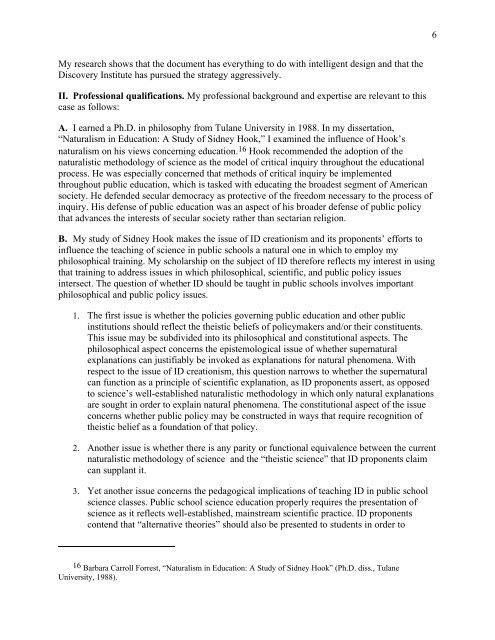Expert Witness Report - National Center for Science Education
Expert Witness Report - National Center for Science Education
Expert Witness Report - National Center for Science Education
Create successful ePaper yourself
Turn your PDF publications into a flip-book with our unique Google optimized e-Paper software.
My research shows that the document has everything to do with intelligent design and that the<br />
Discovery Institute has pursued the strategy aggressively.<br />
II. Professional qualifications. My professional background and expertise are relevant to this<br />
case as follows:<br />
A. I earned a Ph.D. in philosophy from Tulane University in 1988. In my dissertation,<br />
“Naturalism in <strong>Education</strong>: A Study of Sidney Hook,” I examined the influence of Hook’s<br />
naturalism on his views concerning education. 16 Hook recommended the adoption of the<br />
naturalistic methodology of science as the model of critical inquiry throughout the educational<br />
process. He was especially concerned that methods of critical inquiry be implemented<br />
throughout public education, which is tasked with educating the broadest segment of American<br />
society. He defended secular democracy as protective of the freedom necessary to the process of<br />
inquiry. His defense of public education was an aspect of his broader defense of public policy<br />
that advances the interests of secular society rather than sectarian religion.<br />
B. My study of Sidney Hook makes the issue of ID creationism and its proponents’ ef<strong>for</strong>ts to<br />
influence the teaching of science in public schools a natural one in which to employ my<br />
philosophical training. My scholarship on the subject of ID there<strong>for</strong>e reflects my interest in using<br />
that training to address issues in which philosophical, scientific, and public policy issues<br />
intersect. The question of whether ID should be taught in public schools involves important<br />
philosophical and public policy issues.<br />
1. The first issue is whether the policies governing public education and other public<br />
institutions should reflect the theistic beliefs of policymakers and/or their constituents.<br />
This issue may be subdivided into its philosophical and constitutional aspects. The<br />
philosophical aspect concerns the epistemological issue of whether supernatural<br />
explanations can justifiably be invoked as explanations <strong>for</strong> natural phenomena. With<br />
respect to the issue of ID creationism, this question narrows to whether the supernatural<br />
can function as a principle of scientific explanation, as ID proponents assert, as opposed<br />
to science’s well-established naturalistic methodology in which only natural explanations<br />
are sought in order to explain natural phenomena. The constitutional aspect of the issue<br />
concerns whether public policy may be constructed in ways that require recognition of<br />
theistic belief as a foundation of that policy.<br />
2. Another issue is whether there is any parity or functional equivalence between the current<br />
naturalistic methodology of science and the “theistic science” that ID proponents claim<br />
can supplant it.<br />
3. Yet another issue concerns the pedagogical implications of teaching ID in public school<br />
science classes. Public school science education properly requires the presentation of<br />
science as it reflects well-established, mainstream scientific practice. ID proponents<br />
contend that “alternative theories” should also be presented to students in order to<br />
16 Barbara Carroll Forrest, “Naturalism in <strong>Education</strong>: A Study of Sidney Hook” (Ph.D. diss., Tulane<br />
University, 1988).<br />
6

















